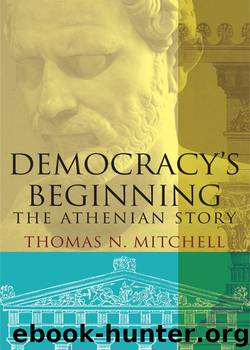Democracy's Beginning by Thomas N. Mitchell

Author:Thomas N. Mitchell
Language: eng
Format: epub
ISBN: 978-0-300-21503-8
Publisher: Yale University Press
Published: 2015-08-28T16:00:00+00:00
CHAPTER 6
Reconciliation and Reform
The restoration of the control of the demos in October 403, and the constitutional modifications that accompanied it and set Athens on course for another eighty years of stable government, form another remarkable chapter in the story of Athenian democracy. For almost a year Athens had experienced increasingly brutal civil strife reminiscent of the stasis that had gripped Corcyra in the 420s. But the outcome in Athens differed markedly from the consequences of the Corcyraean and other Greek civil wars so memorably described by Thucydides. The victors were more intent on peace and unity than on vengeance, and the covenant (syntheke) concluded around the end of September 403 under the auspices of Pausanias and his team of Spartan mediators was focused on a lasting reconciliation, which both sides solemnly swore to uphold.
The terms are well documented. Everyone was allowed to return to their homes and possessions with the exception of the Thirty, the Eleven who had had charge of prisons and executions, and the Ten who had governed the Piraeus. Eleusis, which the Thirty had seized after their defeat at Phyle, was constituted as a semi-autonomous enclave for those afraid to stay in Athens. No access between the two cities was allowed except in relation to the celebration of the Mysteries. Those wishing to settle in Eleusis had to register within ten days of the swearing of the reconciliation oaths and leave within twenty. No one living in Eleusis could hold office at Athens without formally moving residence back to the city.
Trials for homicide in the case of those who had killed or wounded someone with their own hands could proceed under the ancestral laws, but otherwise an amnesty for all past actions was declared for all with the exception of the Thirty, the Eleven and the Ten governors of the Piraeus. Even they would be immune from prosecution if they submitted to the regular euthyna. After the agreement was completed, Pausanias withdrew, and that ended Spartan involvement in the internal affairs of Athens.
The generosity and statesmanship shown by the victors are widely commended in the sources. The Aristotelian Constitution of Athens says that they handled the matter as well as any had ever done in such situations, and contrasts their actions with what happened in other states. It emphasises the priority given to restoring unity and harmony.
Andocides writes in a similar vein. The men from the Piraeus had the opportunity for revenge, but considered the safety of the state more important than personal vengeance. They decided to let bygones be bygones, and bound themselves by oath not to bring up past evils except in relation to the Thirty, the Eleven and the Ten who had governed the Piraeus.
A speech by Thrasybulus, recorded by Xenophon, which was delivered at an Assembly after the men from the Piraeus entered the city, demonstrates the extent of the grievances felt by the democrats, but also their willingness to overcome them. The speech was directed at the oligarchs, and Thrasybulus advises
Download
This site does not store any files on its server. We only index and link to content provided by other sites. Please contact the content providers to delete copyright contents if any and email us, we'll remove relevant links or contents immediately.
| Anarchism | Communism & Socialism |
| Conservatism & Liberalism | Democracy |
| Fascism | Libertarianism |
| Nationalism | Radicalism |
| Utopian |
The Secret History by Donna Tartt(16695)
The Social Justice Warrior Handbook by Lisa De Pasquale(11501)
Thirteen Reasons Why by Jay Asher(7816)
This Is How You Lose Her by Junot Diaz(5811)
Weapons of Math Destruction by Cathy O'Neil(5064)
Zero to One by Peter Thiel(4848)
The Myth of the Strong Leader by Archie Brown(4801)
Promise Me, Dad by Joe Biden(4464)
Beartown by Fredrik Backman(4453)
How Democracies Die by Steven Levitsky & Daniel Ziblatt(4437)
Stone's Rules by Roger Stone(4430)
The Fire Next Time by James Baldwin(4358)
100 Deadly Skills by Clint Emerson(4098)
A Higher Loyalty: Truth, Lies, and Leadership by James Comey(4047)
Rise and Kill First by Ronen Bergman(4032)
The David Icke Guide to the Global Conspiracy (and how to end it) by David Icke(3902)
The Farm by Tom Rob Smith(3887)
Secrecy World by Jake Bernstein(3796)
The Doomsday Machine by Daniel Ellsberg(3744)
